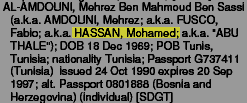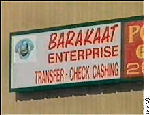 A news item in The Register reports that U.K citizen and government employee Mohammed Hassan has been told by PayPal that his account will be closed if he doesn’t fax to them his passport, a driver’s license, a utility bill, or a document verifying his place and date of birth. The problem is that Mr. Hassan’s name appears here on the SDN list:
A news item in The Register reports that U.K citizen and government employee Mohammed Hassan has been told by PayPal that his account will be closed if he doesn’t fax to them his passport, a driver’s license, a utility bill, or a document verifying his place and date of birth. The problem is that Mr. Hassan’s name appears here on the SDN list:

Mr. Hassan is in a snit over this and is refusing to fax any information to PayPal, saying:
I am not a terrorist or a criminal. How the hell can PayPal link me to that name on the SDN list, is it because my name is Arabic? Or is it because PayPal are just plain stupid?
Mr. Hassan doesn’t understand, and in fairness the PayPal letter to him isn’t clear, that the result of his refusal to provide the identifying information will result in his account being blocked by PayPal, i.e., the money in the account will not be returned but will be placed in an interest-bearing account that cannot be paid to him unless he obtains a license from OFAC. And PayPal has absolutely no choice in this matter once a match is found — even if the match is with one of the many common Arabic or Hispanic names found on the list.
Of course, PayPal’s efforts to comply with OFAC’s sanctions regulations here are as half-hearted as Mr. Hassan is irate. Clearly a faxed document can be easily forged. If indeed Mr. Hassan were the Tunisian terrorist on the list, he would no doubt be quite capable of doing a cut-and-paste job that would look quite convincing when faxed. In fact, a relatively intelligent junior high school student could probably do the same.
PayPal’s dilemma here is understandable. Because of the nature of services that it provides over the Internet, it’s not like a traditional banking relationship where, when a hit on the SDN list is found, the bank can insist on seeing an actual copy — and not a fax — of adequate identification proving that the customer is not the same party as the one on the SDN list.
So Mr. Hassan should fax his passport and PayPal should keep its fingers crossed that it’s the real deal.
(Hat tip to Scott Gearity.)

 Posted by
Posted by  Category:
Category: 

 My guess is that a company press release led to
My guess is that a company press release led to  On August 24, OFAC
On August 24, OFAC  DDTC
DDTC  Recent
Recent 

